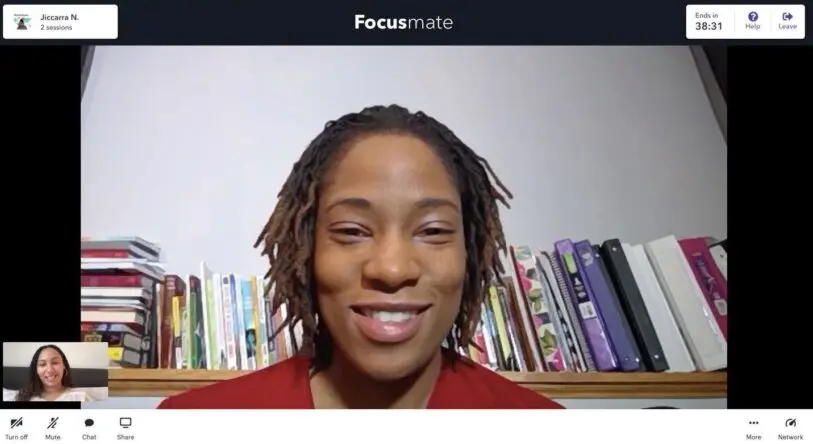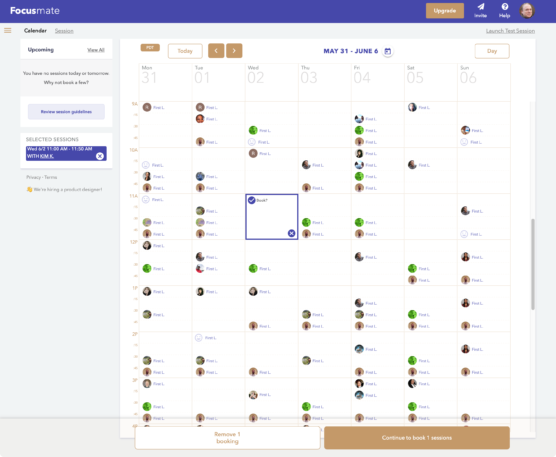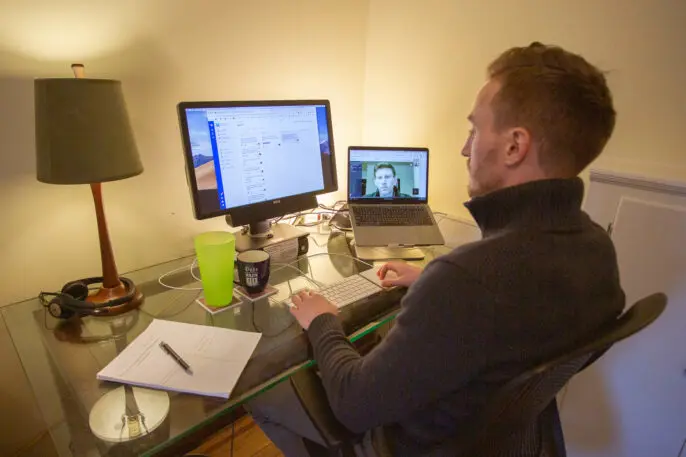Sometimes we need another person—even a largely silent one—to help us reach our goals.
Focusing on tasks intensely enough to make progress is hard enough during normal times. It’s been even tougher as our homes have become both a castle and a prison over the last year. Some of us thrive best in an environment with accountability or collegiality. In a workplace, we may have the thrum of people or the occasional stare of a boss. At home, not so much.
A service called Focusmate addresses the challenges of working alone by pairing people to perform separate tasks at the same time in companionable silence during a video call, with each worker being aware that they’re in the virtual presence of someone else. In effect, it gives people who work from home some of the value of toiling among others, in on-demand form.
Focusmate is modeled after body doubling, a form of personal task accountability that’s common in circles of people who have trouble focusing and may have a self-diagnosis or professional diagnosis of ADHD (attention-deficit hyperactivity disorder). A body double is another person who has a set of tasks to get done, and you agree to pair your unrelated tasks with each other for a short period of time to provide external reinforcement.
Setting up body doubling without an in-person component or trusted friends or colleagues can be tricky. You need to find a partner, set the rules, and make sure you both have time at the right time. And if you know someone too well, you can easily slip into the procrastination mode that led you to seek help in the first place.

Focusmate’s matchmaking eliminates all the pain points and friction while still making a human and humane connection. The service answers the questions posed by its founder, Taylor Jacobson: “How can you combine just the ingredients of providing structure, providing accountability, providing human connection and camaraderie and team spirit?”
The service sets ground rules to keep chat to a minimum and stresses safety and trust to minimize the possibility of abusive incidents. Users must register even to use the free tier, which allows you to book three 50-minute sessions each week. Those who pay $5 per month have unlimited access. While Focusmate lightly anonymizes matching—people list their first name and the initial of their last name—members can choose to find preferred partners and also share their schedules.

Focusmate users tend to swear by it and evangelize for it on social media. Najaf Ali wrote on Twitter, “If you’re struggling with task activation, sustained focus, or any other parts of executive function for knowledge work, sign up and thank me later.” Focusmate has no referral or affiliate program; these are unpaid, unsolicited endorsements.
During a session, users are asked to remain somewhat anonymous, but not aloof, keeping a quick check-in talk to less than 60 seconds, muting their mics for the rest of the session while keeping video running, and then having a quick voice check-in at the end. But even the sense of shared experience of needing Focusmate appears to bring people together, and provide mentorship.
Being paired with struggling students on @focusmate and giving them #positive affirmation (while they don’t know you’re a struggling academic) is slowly becoming my favourite pandemic pastime #KeepMoving
— Dr Abbie Cahoon (@DrAbbieCahoon) April 1, 2021
Though Focusmate is small, it says it’s thrived during the time of confinement brought on by the pandemic, with 180,000 sessions conducted in March 2021 among 10,000 users located in 160 countries. While the privately held firm doesn’t disclose revenue, online estimates put its annual run rate in the high hundreds of thousands of dollars, which would indicate a high subscription uptake. (The company declined to refute or confirm these numbers.) It previously raised tens of thousands via crowdfunding—not the Kickstarter variety, but the small-dollar investment variety enabled by a 2015 federal law.
Despite its global participation, the service for now is entirely in English, both in interface and its expectation of the joint language between participants. But given the rise in comfort level with people for remote videoconferencing and working from home, the potential audience for Focusmate and any competing services that might appear is far above 10,000 monthly users. It’s potentially in the hundreds of millions.
“My particular flavor of procrastination”
As with most startups, Focusmate has an origin story that matches its purpose. Founder Jacobson says he was a high performer in a job working in an office, but switched to remote work and nearly overnight began to struggle. “My particular flavor of procrastination: I would be at the computer, I’d be doing stuff, but somehow the lack of structure, the lack of people—it just affected my brain, my mental health. I became very unproductive.”

According to Jacobson, the experiment was an immediate success. “The waters parted—this was five years into working remotely for me,” Jacobson says. “Wow, I’ve tried everything. And nothing has really worked to provide the relief and the focus that I wanted, and this really simple thing just worked.”
Reports of abusive behavior on Focusmate seem to be nonexistent, despite broad discussion of the service on social networks and blogs.
Focusmate wasn’t conceived for people with ADHD. Nor has its product development been focused around them. But Jacobson says that neurological type is a strong trait among its users. “It’s a very happy by-product of bringing a very inclusive approach and a very hands-on approach to supporting people.”
Um. I just had my first session over at @focusmate and I think it may be the best tool I've ever used to help me with #ADHD. Having an appointment with someone created exactly the people-pleasing push I needed.
I did stuff. Wow.#adhdtwitter #adhdautism #NEISvoid— Art first, then chores. (@AmberAubade) May 18, 2021
The spark for Focusmate didn’t require much kindling: Jacobson recalls some 100 to 200 people coming from the Facebook group to his site. He says keeping it simple helped provide enough critical mass early on. Sessions could be scheduled only on the hour, and most participants were working a normal business day on the East Coast.
Because the service matches pairs of users, any given person needs only to find one other at a time that works, avoiding the many-bodies problem of scheduling three or more people. A “big head” of people on the adoption curve also used Focusmate heavily, allowing other frequent and less-frequent users to find a match more easily—to create appointment “liquidity,” as Jacobson describes it. Without that critical mass of frequent users, the service might not have worked.
Readers who are mathematically minded may note, however, that because it takes two to tango, a dozen or two people a day—more than 96 available starting time slots—might finish Focusmate’s game of musical chairs as the odd one out. But as long as an even number of people are looking for a match for any given time slot, Focusmate can pair them all up. That would be true regardless of whether the service had 10,000 or a billion users.
“Our experience is that the person who doesn’t get a partner isn’t super surprised or dismayed, since they’re booking about 30 seconds before the time slot,” Jacobson says, adding that Focusmate will eventually be able to offer on-demand sessions, which would obviate even that issue.
Unlike the situation with many services that enable person-to-person connections, reports of abusive behavior on Focusmate seem to be nonexistent, despite broad discussion of the service on social networks and blogs. To get started, users have to register with their email and validate receipt of a confirmation. Only then can they schedule a time. That doesn’t eliminate the the possibility of troublemakers intruding on the experience, but it does make it tougher for trolls.
“We’ve taken [safety] very seriously from day one,” Jacobson says, “and invested a lot in our process and learning from the best experts out there on how you build great trust and safety protocols.” Without any potential to engage in Zoombombing-style interference in group events, the negative “reward” isn’t high enough.
However, Focusmate users are encouraged to report violations of the basic rules that encourage accountability, such as not showing up for a scheduled session, leaving early, turning off video, leaving the area without alerting the partner, and a few others. It’s also entirely forbidden to solicit business or chat someone up.
To control costs, the company creates only the secret sauces necessary to offer its service. It uses a third-party video-connection service instead of rolling its own. It actually has two such contracts, with the second providing a fallback if the first fails to start a session, the better to avoid disappointing users who rely on the service.
Same accountability, bigger groups
Focusmate has become Jacobson’s full-time job and is currently hiring. So far, the service lacks a social graph, preferring just to match two people without preconceptions. But more social networking-like features are on the road map. (For now, members can share a link to upcoming scheduled appointments, letting someone else express a preference within the system on matching that person, but the match isn’t guaranteed.)
The service is currently testing paid private groups, which preferentially match people with other members of the group. These groups come in two forms. Basic groups cost $50 per month and any user may join, whether they have a free membership or a paid one. The higher-end tier has the group’s administrator pay for premium Focusmate service for all members. It costs $50 per month for 10 memberships; additional members may be added for the standard $5-per-month price.
OMG I was late to my focusmate session. Sometimes when I write I get distracted, so I use focusmate. This time I was writing so I got distracted that I had a focusmate session! 🙂
— Julie JordanScott (@JulieJordanScot) May 22, 2021
Jacobson says private groups let the company test how “we can amplify the appeal and effectiveness of the experience by putting people together based on different types of affinity or affiliation. That might be that you are both writers, or that you both work for the same company, or that you both are taking the same online course.”
For now, rather than being structured around characteristics or affinity, Focusmate’s group feature only allows existing groups (such as a company or writers’ group) to utilize the service. In the future, groups could be formed that, say, allow only women to join, require one’s mic to be on, or allow people to perform new sorts of tasks—such as exercising—in parallel. Jacobson says the current test is designed to inform such future efforts.
With a vast audience of remote workers to draw from, the potential for Focusmate’s simple idea to grow more expansive seems inevitable and worthwhile. Other productivity tools such as smartphone timers can’t provide the human touch. And after a year of limited contact, many people will welcome the presence of a vetted stranger. My wife, who coaches entirely remotely, says, “I’m charmed by the diversity of people that I’ve been paired with, in terms of where they live across the globe. My favorite so far was being paired with somebody who was practicing cello in Austria.” With the sound off, for better or worse.
Recognize your brand’s excellence by applying to this year’s Brands That Matter Awards before the early-rate deadline, May 3.
